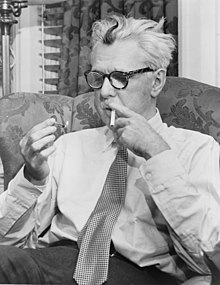James Thurber
| James Thurber | |
|---|---|

James Thurber in 1954
|
|
| Born | James Grover Thurber December 8, 1894 Columbus, Ohio, U.S. |
| Died | November 2, 1961 (aged 66) New York City, U.S. |
| Resting place | Green Lawn Cemetery, Columbus, Ohio, U.S. |
| Occupation | Humorist |
| Nationality | American |
| Period | 1929–1961 |
| Genre | short stories, cartoons, essays |
| Subject | humor, language |
| Notable works |
My Life and Hard Times, My World and Welcome to It "The Catbird Seat" "The Secret Life of Walter Mitty" |
| Notable awards | Tony Award for "A Thurber Carnival" (1960) |
| Spouse |
Althea Addams Thurber (1925-1935) Helen Wismer Thurber (1935-1961) |
| Children | Rosemary Thurber |
Althea Addams Thurber (1925-1935)
Helen Wismer Thurber
James Grover Thurber (December 8, 1894 – November 2, 1961) was an American cartoonist, author, humorist, journalist, playwright, and celebrated wit. Thurber was best known for his cartoons and short stories, such as "The Catbird Seat", published mainly in The New Yorker magazine and collected in his numerous books. One of the most popular humorists of his time, Thurber celebrated the comic frustrations and eccentricities of ordinary people. In collaboration with his college friend Elliott Nugent, he wrote the Broadway comedy The Male Animal, later adapted into a film, which starred Henry Fonda and Olivia de Havilland. His short story "The Secret Life of Walter Mitty" has been adapted for film twice, once in 1947 and once in 2013.
Thurber was born in Columbus, Ohio, to Charles L. Thurber and Mary Agnes "Mame" (née Fisher) Thurber on December 8, 1894. Both of his parents greatly influenced his work. His father, a sporadically employed clerk and minor politician who dreamed of being a lawyer or an actor, is said to have been the inspiration for the small, timid protagonist typical of many of his stories. Thurber described his mother as a "born comedian" and "one of the finest comic talents I think I have ever known." She was a practical joker, and on one occasion pretended to be crippled and attended a faith healer revival, only to jump up and proclaim herself healed.
Thurber had two brothers, William and Robert. Once, while playing a game of William Tell, his brother shot James in the eye with an arrow, and Thurber lost that eye. This injury would later cause him to become almost entirely blind. Unable in his childhood to partake in sports and other activities because of his injury, he elaborated a creative mind which he then used to express himself in writings. Neurologist V .S. Ramachandran suggests Thurber's imagination may be partly explained by Charles Bonnet syndrome, a neurological condition that causes complex visual hallucinations in otherwise mentally healthy people who have suffered some level of visual loss. (This was the basis for the piece "The Admiral on the Wheel".)
...
Wikipedia
